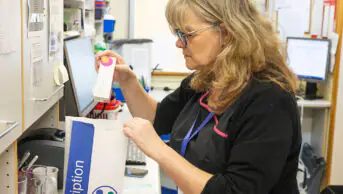
Shutterstock.com
There has been a net loss of 432 community pharmacies in England in the past financial year (2023/2024), according to an analysis of figures from the NHS Business Services Authority (NHSBSA).
Pharmacy openings and closures data published by the NHSBSA in March 2024, and analysed by the Company Chemists’ Association (CCA), show that this was comfortably the highest annual net number of closures since 2015/2016.
On 29 April 2024, the CCA said there has been a total of 1,180 net closures of community pharmacies in England since 2015/2016.
Using the Department for Levelling Up, Housing and Communities English Indices of Deprivation, the CCA analysis said that 34.9% of these closures happened in the top 20% of the most deprived parts of the country.
In October 2023, The Pharmaceutical Journal reported that there were 91 net closures of community pharmacies in England in the 2022/2023 financial year. This was the fifth year in a row that the number of community pharmacies in England had fallen.
In June 2023, all 237 of LloydsPharmacy’s branches in Sainsbury’s supermarkets were closed. Boots also announced in June 2023 that 300 of its pharmacies would close over the next year, in addition to the 200 branches that had closed since 2019.
Asda and Tesco also announced closures during 2023, with Asda closing seven pharmacies and Tesco closing eight pharmacies.
Commenting on the NHSBSA data, Malcolm Harrison, chief executive of the CCA, said: “Pharmacies continue to close at an unprecedented rate. The real-terms cut to core funding of over 30% since 2015 is simply untenable.
“Our analysis has also highlighted that, unfortunately, these closures are disproportionately affecting the communities who need primary care access the most.
“Pharmacies cannot be expected to operate at a loss, and effectively subsidise the NHS, any longer. Without significant additional funding, fewer pharmacies will result in patients finding it even harder to access the medicines and clinical NHS care that they need,” he added.
Commenting on the closures, Janet Morrison, chief executive at Community Pharmacy England, said: “We have known for some time that community pharmacies are at the brink of collapse, and the CCA’s analysis confirms that stark reality.
“We have already seen pharmacies up and down the country being forced to close temporarily, making reductions in opening hours where they can, reviewing their estates, and, if they can, closing branches.
“The message to government and the NHS remains clear: if you do not reverse this policy, and fast, the impact on pharmacy businesses will be catastrophic, and vital services to patients will become ever more chaotic, with medicines supply potentially critically at risk,” Morrison added.
Also commenting, Olivier Picard, vice chair of the National Pharmacy Association, said: “Many independent pharmacies are running a deficit and there’s a financial cliff-edge over which thousands of pharmacies could tumble, without fresh investment in the sector.
“We urgently need a new deal for community pharmacy which stops the closures and allows pharmacies to develop as providers of integrated clinical services.”
In May 2023, the UK government said it would invest an extra £645m in community pharmacy over the next two years, part of which is funding the Pharmacy First minor ailments scheme, which was launched in England on 31 January 2024.
A spokesperson for the Department of Health and Social Care said: “More than four in five people live within a 20-minute walk of a pharmacy, and there are twice as many pharmacies in deprived areas, making access to care quicker and more convenient.
“We have made up to £645m of new funding available over two years to support the expansion of community pharmacy services, which comes on top of the £2.6bn pharmacies already receive per year.
“Pharmacy First has been widely welcomed by the pharmacy sector and, so far, 98% of pharmacies have signed up.”


